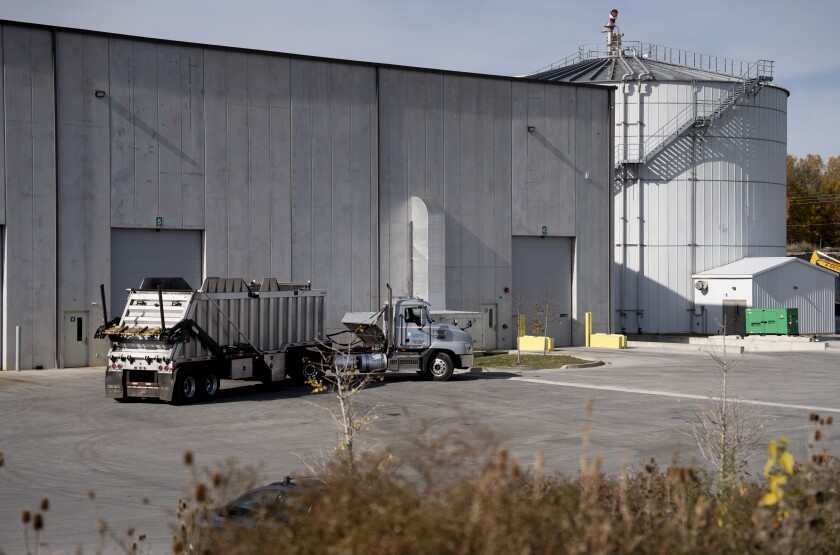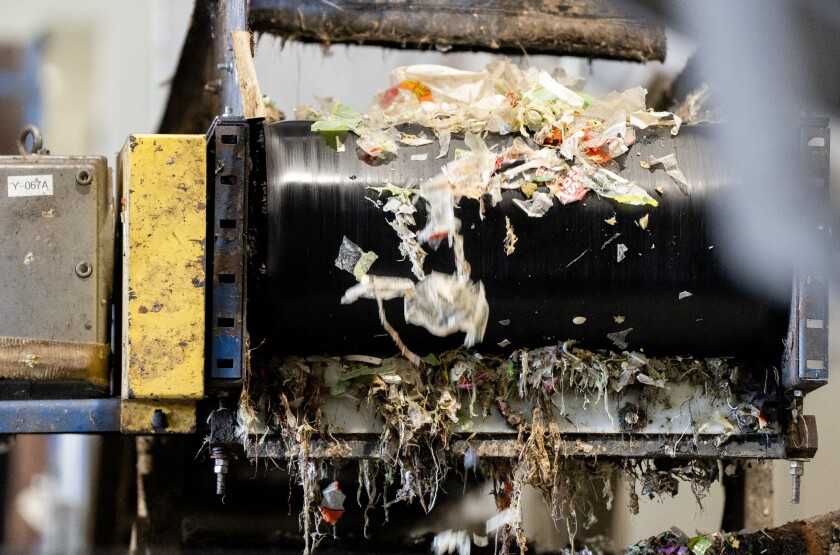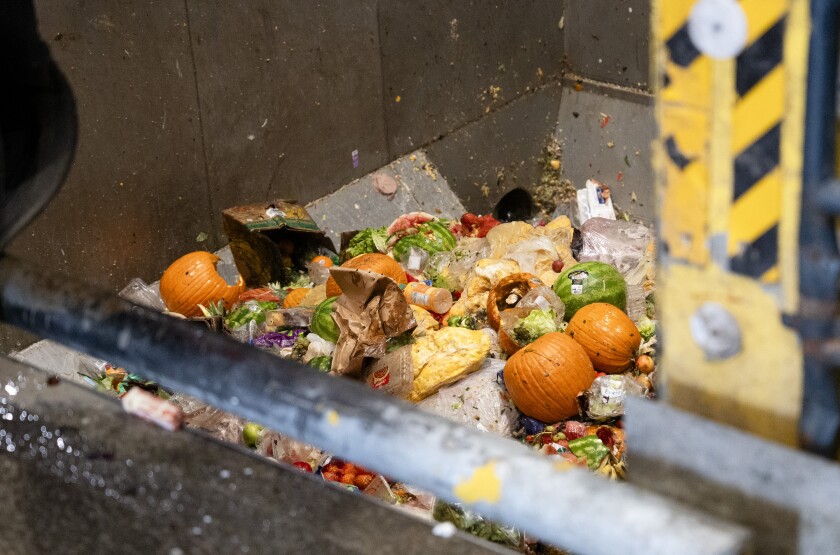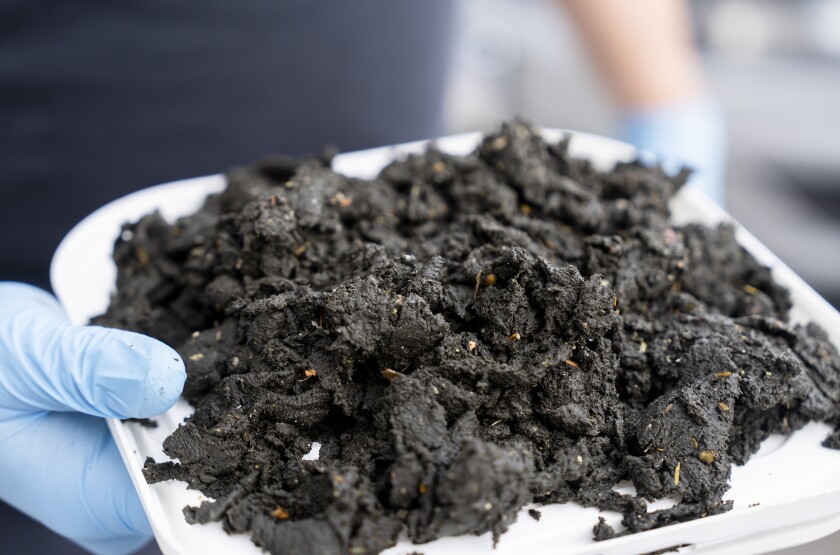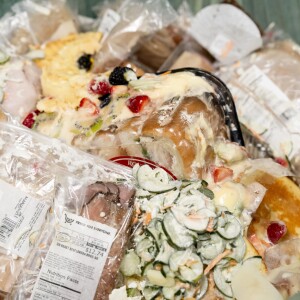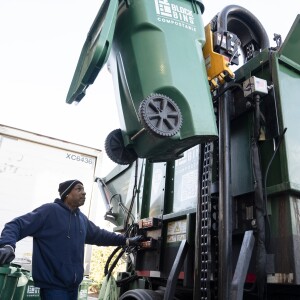Each day at the Green Era Campus in Auburn Gresham, trucks drive into a cavernous industrial facility to unload withered vegetables, fruit and other inedible food into a giant metal pit. The waste is sifted then funneled to an enormous tank called a biodigester. After a weeks-long process, the system will yield compost for urban farms in Chicago.
The biodigester officially launched this spring and has transformed a previously contaminated South Side lot. It’s likely the Midwest’s first large urban biodigester that only processes food waste, according to Jason Feldman, co-founder of Green Era. The system is unique because it can accept food in packaging such as plastic bags — special equipment separates inorganic material.
The $40 million project is groundbreaking because it captures methane, a greenhouse gas more potent than carbon dioxide. Organic waste often rots in landfills and releases methane, which contributes to global warming.
Green Era’s closed, oxygen-free biodigester captures methane from decomposing food and turns it into renewable natural gas on the 9-acre site. Since June, Green Era has supplied that gas to utility company Peoples Gas to power as many as 3,000 homes.
Biogas systems like Green Era “are the number one way to reduce methane emissions, which is the number one contributor to climate change now,” said Patrick Serfass, executive director of the American Biogas Council in Washington, D.C. “We want to see more projects like Green Era. It shows other cities what’s possible.”
If Illinois captured methane from all its food waste and converted it to renewable gas, that would be “transformational,” Feldman said. Food waste is a valuable resource, he added. “Hopefully we will look back one day and say, ‘I can’t believe we used to throw that out.’”
Each year, Chicago sends more than 55 million pounds of food waste to landfills, according to the Chicago Community Loan Fund.
More than one-third of the food produced in the U.S. is never eaten, according to the Environmental Protection Agency. Food loss and waste account for 8% to 10% of annual global greenhouse gas emissions — nearly five times the total emissions from the aviation sector, the United Nations Environment Program said.
Green Era’s biodigester diverts about 85,000 tons of food waste from landfills annually — equivalent to the emissions of 12,800 cars. It recycles about 5 million to 10 million pounds of food waste each month.
Food waste arrives at Green Era from clients such as the Northern Illinois Food Bank and Greater Chicago Food Depository, restaurants, condo associations, supermarkets and compost services such as Chicago-based Block Bins.
Grocery chain Mariano’s began working with Green Era in 2023 and pays Block Bins to bring food waste there. As of October 2025, the supermarket recycled nearly 1.4 million pounds of food waste through Green Era. That has kept more than 1 million pounds of carbon emissions out of the atmosphere, according to Mariano’s.
The grocery started with food waste from its Oak Lawn and Evergreen Park stores. Mariano’s has since expanded to eight more locations, including supermarkets in the West Loop, South Loop, Bridgeport, Edgewater, Ukrainian Village, New City, Westmont and Lakeshore East.
“By turning waste into compost, we support local farms, reduce landfill impact and create a cleaner, greener future,” Michael Marx, division president of Mariano’s and Roundy’s, said.
Green Era’s model could be replicated elsewhere, Feldman said. “There are big vacant industrial sites all over the Midwest that left behind contaminated sites.”
Green Era is also a global model. This month food waste was a key topic at the United Nations COP30 climate change summit in Belem, Brazil. In 2021, Green Era won a prize for climate change adaptation, at the UN COP26 summit in Glasgow.
Back on the South Side, the biodigester serves as an anchor of a new green economy in under-resourced Auburn Gresham, Feldman said.
More than 30% of Auburn Gresham’s population have an annual household income of less than $25,000, according to the 2019-2023 American Community Survey. About 10% have a bachelor’s degree, and 93% of the population is Black.
Green Era shows that “food waste is a resource that can power homes, grow food, create jobs and economic development and inspire youth,” Feldman said. “It connects all those dots together.”
In spite of recent federal policies that pose setbacks for some green energy sectors, Feldman hopes Green Era can still inspire people to support environmentalism however they can. The project might make someone realize “that banana peel can be part of a solution,” he said.
Fresh start
Green Era took over a formerly derelict lot at 650 W. 83rd St. The site was once home to Weber Wagon Works’ wheel factory. Agricultural machine maker International Harvester bought the factory in 1904, according to the Wisconsin Historical Society. More recently, it was a city auto impound lot until 2010 and an illegal dump.
The site was “nasty, cruddy, dirty,” recalled Carlos Nelson, CEO of the nonprofit Greater Auburn Gresham Development Corp., Green Era’s largest investor with a 33% stake.
“The city’s auto pound used to tow our cars there, and after that closed, it became a place for fly dumping,” said Nelson, who grew up in Auburn Gresham. “There were rats, all types of rodents running around.”
Green Era Campus’ partners include for-profit biodigester Green Era Sustainability; nonprofit site owner Green Era Educational NFP; and Urban Growers Collective, an agriculture nonprofit.
In 2015, Green Era Educational NFP bought the property from the city for $1. The site was heavily polluted; the city estimated environmental remediation costs at $1.6 million.
Planning took several years before construction began in late 2020. Green Era received its first load of waste in spring 2023 from the Northern Illinois Food Bank. In summer 2024, its gas connection started.
At the campus’ ribbon-cutting ceremony in April, Gov. JB Pritzker said, “I am grateful for the work that Urban Growers Collective and Green Era have done to provide access to fresh food, minimize food waste and produce renewable energy on the South Side of Chicago.”
Bootstrapping
Launching Green Era was challenging because it was expensive and upended established systems, according to Feldman.
“There was a big education curve,” Feldman said of raising awareness about biodigesters and creating energy from food waste. “Every time you do something new, it takes time.”
Green Era navigated that new territory during the turmoil of the COVID-19 pandemic. “All that instability was really, really hard,” Feldman said. “We bootstrapped the whole process.”
Initial funding came from a $3 million Chicago Community Loan Fund. Other financing came from Benefit Chicago, nonprofit IFF, the Reinvestment Fund, public agencies and investor groups.
In 2020, the project won the inaugural $10 million Chicago Prize from the Pritzker Traubert Foundation. It also won a $3 million Rebuild Illinois infrastructure grant from the state.
Green Era fits with Illinois’ economic development strategy, which prioritizes investment in technology, clean energy, agriculture, food industries and more. To that end, Green Era and the U.S. Department of Energy’s Argonne National Laboratory in June agreed to jointly apply for research funding related to climate change, water, energy and food.
The U.S. has about 2,500 biodigesters, according to the American Biogas Council. A small number of them, including Green Era, only recycle food waste. Others typically process sewage system sludge or farm manure.
Green Era stands out because it originally started to “solve community challenges. It wanted to address food desert issues by creating community gardens,” said Serfass, of the American Biogas Council.
But Erika Allen, Green Era co-founder and CEO of Urban Growers Collective, couldn’t get enough compost, which sparked ideas about sourcing it themselves by building a biodigester.
Most biogas projects start the other way with, “‘I have a waste problem’ and how to make enough money to deal with the waste problem,” Serfass said. Green Era is “super unusual,” he said.
Greening Auburn Gresham
By bringing green tech to a once-blighted lot, Green Era boosts a disinvested neighborhood.
Construction of the system created hundreds of jobs. The campus has nearly 20 full-time employees and plans to expand. Roles include forklift operators, heavy machinery specialists, maintenance and engineering workers.
A majority of its staff live in Auburn Gresham or nearby. Green Era also focuses on hiring people affected by the justice system and who don’t have college degrees.
The biodigester brings opportunities and a new vocabulary to Auburn Gresham, said Nelson, of Greater Auburn Gresham Development Corp. “We’ll grow our own mechanical engineers, data scientists and green technicians right here. There’s now an awareness and pathway for those opportunities based right here in our community.”
Green Era also expects to build a greenhouse and urban farm on the site, as well as a retail store, community green space and education center. Construction of its $10 million second phase is slated to begin next year.
“We don’t often think of a former auto pound as something that’s harmed our community environmentally, but it really did,” Nelson said. “Those memories aren’t fond ones — but to see what it’s become now, that’s powerful.”







